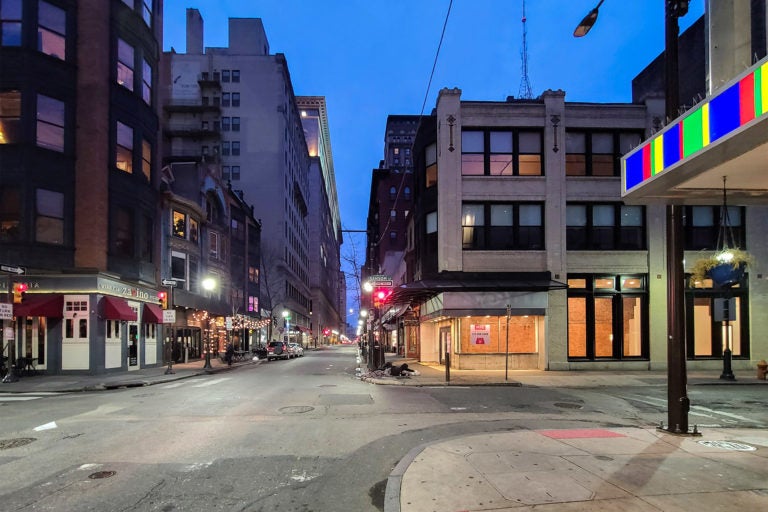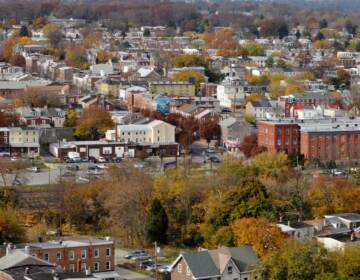How coronavirus will disrupt Philly’s residential real estate market
Coronavirus will disrupt Philadelphia’s real estate market but each sector will feel the impact differently.

The intersection of 13th and Sansom streets is empty on a recent evening. (Danya Henninger/Billy Penn)
Coronavirus has already shaken Philadelphia’s economy and changed our daily lives. As the pandemic intensifies, it will undoubtedly impact the local real estate market – especially for those who had been preparing to buy or sell a home this spring. While much will depend on the length of time it takes to contain the spread of the virus, I believe that the impact will be different across three different price points in the local market, which has three different types of buyers.
First-time homebuyers
The first rung of the local homebuyer market consists of people buying homes in the $100,000 to $300,000 price range. These are often first-time homeowners who earn an hourly wage and have little in the way of savings for a down payment and little financial cushion for downturns in earnings. This group also includes small business owners, including mom-and-pop businesses with a single location.
They are the people likely to be hardest hit by closures, reduced hours and short-term layoffs. Many of them have no sick pay, no paid leave, and will not be eligible for unemployment pay if they are business owners, gig workers or are working on reduced hours.
Accordingly, this segment of the housing market will likely take the greatest hit in the coming weeks and months. With first-time buyers unable to move because of the coronavirus’ economic impacts, available housing stock risks getting gobbled up by investors looking for single-family properties to rent out. The impact: fewer affordable homeownership options in the area, which would aggravate a problem faced by the city since 2008.
If Philadelphia and surrounding suburban areas want to avoid worsening our affordability crisis, local governments will need to work in concert with lenders to promote and expand first-time homeownership programs. Public and private support will be needed to rebuild the stability and family wealth-building opportunities that homeownership represents and ensure that the region’s recovery doesn’t leave anyone behind.
Move-up buyers
The second rung of the local market encompasses buyers seeking homes in the $300,000 to $750,000 market, even going as high as $1 million. It’s the rung likely to experience the least disruption due to coronavirus.
I call people on this rung move-up buyers. They are people trading up to a bigger or more expensive home and often first-time buyers with professional occupations. These are the people most likely to have stable salaried jobs that can work from home during this crisis. Many of these workers have flexibility in their jobs, and their income is unlikely to be impacted by the disruptions in the workplace.
These are also folks who are likely to have sufficient savings for a down payment and closing costs, and who have long-term views on life decisions, just as they made by spending or borrowing for college, and professional graduate education. These home searches are often to accommodate changes in households, or to be in a desired school district, factors that will still exist when the crisis passes. Spending more time at home this month may reinforce the need or desire to make a move that better meets their family situation.
Some proportion of this group will be concerned enough about overall economic impacts to delay a decision about moving. However, a month ago, homes selling in this range commonly had three to eight multiple bids at or over asking prices, with homes selling in days, if not hours. So, given the previous undersupply of homes for these buyers, most sellers in this price range will still be able to find buyers.
Luxury buyers
The third tier is the pool of people buying properties priced above $1 million. These buyers think in terms of wealth, not income when deciding how much they can afford to spend on a property. It is not uncommon for homes on the market for over $1 million to be purchased with cash or large down payments.
This is the portion of the market that is harder to predict. These households are secure in meeting their monthly expenses, but they are also the most likely to have significant stock portfolios that have taken wild gyrations on a daily basis. Some of these folks may see stability in purchasing real estate now while some may not want to withdraw assets in this market. Others will try to leverage uncertainty to drive even harder deals to buy a home if they think a seller will be more willing to reduce the price for the certainty of a sale.
A place to call home
Housing markets work on longer-term outlooks than job markets. Housing data is usually reported in quarterly or annual statistics, unlike employment that has closely watched monthly and even weekly data, especially around job creation and unemployment numbers. So, a disruption that lasts three to six weeks at its peak is basically the time it takes one home buyer to go from an offer on a house through mortgage approval to closing. If the coronavirus disruption lasts that duration, the spring market will likely be delayed, with different impacts across these three submarkets. A disruption lasting into or through the summer would likely have deeper impacts, but that will need to be revisited if the situation on the ground remains unchanged through Memorial Day.
But no matter what challenge we are confronting as a city at any given time, everyone needs a place to call home — food, shelter, and health are the three basics needed to sustain life. Eventually, the market will recover and so will we.
WHYY is your source for fact-based, in-depth journalism and information. As a nonprofit organization, we rely on financial support from readers like you. Please give today.


![CoronavirusPandemic_1024x512[1]](https://whyy.org/wp-content/uploads/2020/03/CoronavirusPandemic_1024x5121-300x150.jpg)




